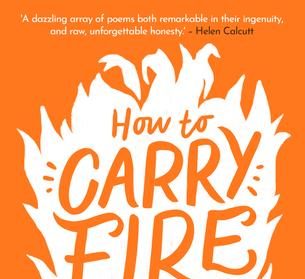Kathy Miles reviews the second collection from Christina Thatcher, How to Carry Fire (Parthian).
In a remarkable second collection, Christina Thatcher not only teaches us How to Carry Fire, but demonstrates that from the flames can emerge love, passion, beauty and resolution. These are raw, honest poems, powerful in their effect. Although each poem stands alone, like individual embers glowing inside a grate, they also slot into a strong and cohesive narrative structure.
Divided into two parts, the first begins with a house fire, and the difficult task of itemizing the things that have been lost: ‘How many forks? / How many pairs of underwear? / How many items in the fridge?’ Also destroyed are items of family history:
the stained glass unicorn
that Sioux tribe necklace
our grandfather’s final brick
(‘Insurance Report’)
It begs the question not just of their financial value, but of how we identify ourselves and our place in the world through these personal totems.
Whilst fire is the leitmotif for the book, a father’s death and a brother’s drug addiction are other potent agents of loss; subjects which are tackled with skill and courage. Thatcher presents a world where danger is all around, and comes from many different sources. From Herman, the poisonous jellyfish she wants to rescue as a child, to the salamander she tries to hold, until
my uncle tugged my arm so hard
the socket openedbriefly releasing the bulb
of a shoulder. Those colors mean
it’s poisonous, he said,
watch out for them.(‘Temptation’)
The real danger is that – like the salamander – many of these external threats are also temptations, and the salve for them is a ‘tough love’ which itself often borders on violence.
Thatcher writes movingly about her brother, and the effects of his long-term opiate addiction. In ‘Becoming an Astronaut’ she lists the things he must do in order to achieve his childhood dream:
You must learn to scuba dive, to survive
in the open ocean, tread water for hours. You must fly
a T-38 Talon Jet, learn Russian.
But the advice is already too late:
You must
embrace fear but understand, too, that you are ready:
you have been training for this since the first day
you picked up a needle and took yourself to the moon.
In a period of withdrawal, his craving is portrayed as an obsession with silver spoons:
You dream only of metal. The pastor tells you:
This is normal. You must simply let go of the spoons.
You accept this but the sink still fills up with silver.
The shower spits sterling. Rid yourself of temptation,
my son. The pastor has our father’s blue-green eyes.(‘Detox Passage’)
Yet the impulse to be a rescuer is in itself a temptation, with emotional consequences for those attempting it, whether as a ‘house canary’, camping on the floor to protect the family from ‘the burn of bad people who’d let themselves in’ (‘Sentry’), saving a hummingbird from beating itself against the glass, or trying to scoop a jellyfish from its confining tank. The narrator is vigilante and protector as well as sister, constantly trying to save her brother from himself, yet ultimately admitting the impossibility of the task:
‘We never had the right gear for this. / We never learned to rescue.’
(‘Addicts die a thousand deaths’)
The remedy Thatcher reaches for is fire, with its ability to cleanse and purify as well as to destroy:
Take what those flames
can give you. Feel heat enter your stomach.Stay wary now. You must never let the light
go out. Keep it lit until you learn to glow.(‘How to Carry Fire’)
With cleansing comes tenderness and compassion. The poet longs for her brother to sit on her knee
like you did when you were my
much littler brother so I can tell youof a place where the bricks of our childhood
home still stand, the kitchen smelling sweet
of pumpkin pie and whipped cream.(‘An Improper Kindness’)
Understanding, too, for the father who once slid a poker across their mother’s neck, but who also worked hard, all the while ‘snatching snakes from the ground / to protect us from poison.’
In the second part of the book, the poet relocates from America to Wales. Here begins the slow healing process, like new skin growing where the blistered skin has peeled away. Recovery comes through finding love, and a different life where she is reminded that ‘we are full / of blood, alive and buzzing like / the wasps outside, ripe as mangoes.’ (‘University for Peace’). Fear and uncertainty still intrude, manifesting themselves in imagined scenarios where her new husband will die, and in dreams where addicts ‘break into the house / and music erupts: bowel-rumbling / kettle drums’. But there is solace here too. Wales is a ‘small coat / with deep pockets’ and Thatcher digs her hands in to find ‘skeletons / of winter trees, crumpled / forest ferns, flakes of mud’ as well as ‘steeples, churches, / the sounds of singing, bells’ (‘Keeping Warm’).
The book ends on hope. Thatcher is a survivor, a phoenix rising from the ashes of loss and trauma, inviting the reader to:
Love like the horse chestnut loves carbon,
like the sun isn’t millions of miles awayor doomed. Love like a blue fir amongst white pines,
like a wide shovel opening the earth.’(‘How to Love a Gardener’)
A fine achievement from this very accomplished writer.
How to Carry Fire by Christina Thatcher is available now from Parthian Books











